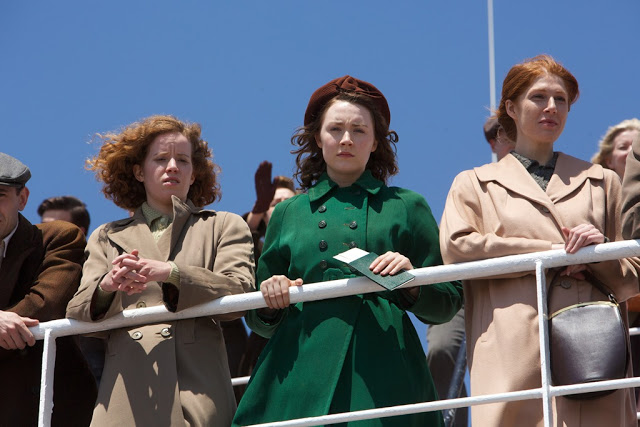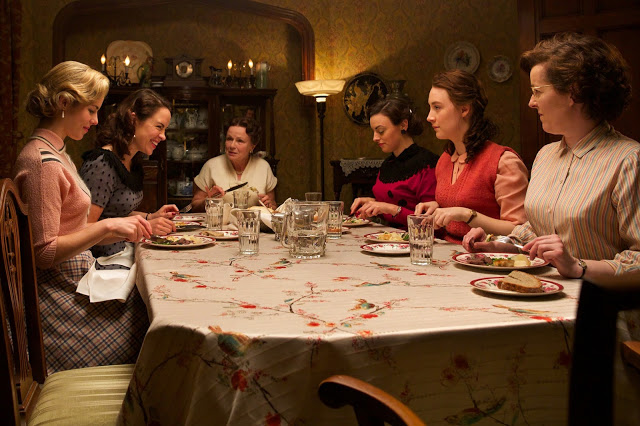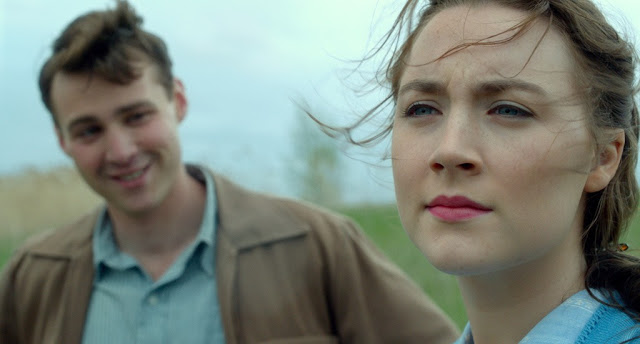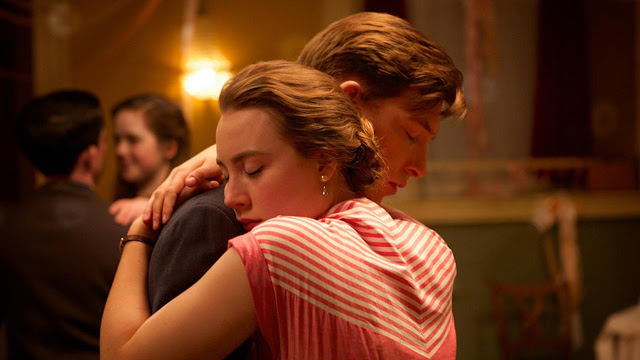Brooklyn is a movie about an immigrant seeking a modest life on America’s rocky shores. In these tumultuous times, that alone makes it an interesting artifact. But while it is a thoroughly global production—it was directed by the Irishman John Crowley from a screenplay by the English writer Nick Hornby, adapting a book by Irish novelist Colm Toibin, and it is being distributed here by the American studio Fox Searchlight—it is not concerned with current political or social issues. In fact, it has little interest in contemporary complexities at all. On the contrary, Brooklyn—with its period setting, its classical warmth, its swooning simplicity—is proudly, almost brazenly old-fashioned.
That is a dangerous label to apply to a movie, one that suggests either snobbish nostalgia (“They don’t make ’em like they used to!”) or sneering modernism (“Old movies are so dated!”). But Brooklyn is neither a strained tribute to pictures of the past nor a wistful critique of the uncertainties of the present. It is instead its own creature: funny, tender, a little bit treacly, and entirely true. At its core, Brooklyn is about nothing more than a woman searching for happiness. Watching it, you will have no struggle finding the same.
Though it is set primarily in New York City’s most populous borough, Brooklyn begins in the calmer, greener country of Ireland. The year is 1952, and the future immigrant in question is a young woman named Eilis (a magnificent Saoirse Ronan), whose current prospects are decidedly lackluster. Though she clerks part-time for an ironfisted shopkeeper (Brid Brennan), she has no steady employment, and she worries that she is a burden to her sister, Rose (Fiona Glascott), and her mother (Jane Brennan). Sensing her sister’s restlessness, Rose works with a priest to arrange passage for Eilis (pronounced A-lish) to America. In these brisk early scenes, Crowley effectively establishes an atmosphere of well-meaning oppression. Eilis is by no means tormented—she gets on well with her mother and sister, and she recognizes the essential serenity of her homeland, with its dusky streets and small-town geniality—but she also seems constricted by Ireland’s relentless quietude. She’s trapped, and it’s time for her to flee to the new world.
Eilis’s crossing of the Atlantic by boat is a tidy and economical piece of storytelling; frail at first, she picks up invaluable tips from Georgina (Eva Birthistle, popping off the screen in a few meager minutes), a fellow traveler with a tart tongue and fire-engine nail polish. But once Eilis passes through Ellis Island’s double doors—in an image beautifully captured by cinematographer Yves Bélanger, who shot Jean-Marc Vallée’s Wild—Crowley sets about delineating her life in the States, at which point Brooklyn takes wing. Eilis finds herself living in a sturdy boarding house, which is run with no-nonsense charm by Mrs. Kehoe (Julie Walters, delightful), a fastidious matriarch whose fussy demeanor belies a hidden generosity. There, Eilis shares lodging with several other Irish immigrants, each with their own eccentric flavor: There are a pair of tittering rumormongers, Patty and Diana (Emily Brett Rickards and Eve Macklin, both very good); a sullen divorcée, Sylvia (Nora-Jane Noone); a prim churchgoer, Miss McAdam (Mary O’Driscoll); and a flighty flibbertigibbet, Dolores (Jenn Murray).
Brooklyn features a heaping of marvelous moments, but it is never better than when cramped inside the confines of this remarkably unremarkable boarding house. A stout brownstone, it carries the air of a portal, as though countless women have skittered up and down its steps on their voyage toward the American dream. And for Eilis, who quickly grows homesick for Ireland, the house provides a crucial sense of community, a place where she can laugh, cry, commiserate, and gossip. It is also where Hornby pens his best dialogue, turning mundane conversations into symphonies of stinging barbs. Mrs. Kehoe is a fount of withering sarcasm and clipped disapproval, and Walters is enormously crowd-pleasing in the part; a scene in which she declares giddiness to be the eighth deadly sin will make you, well, downright giddy. But the more affecting passages involve Eilis’s interactions with Patty and Diana. These two boarders, who are older and more worldly, initially come off as superior snoots (think Cinderella’s stepsisters crossed with the Plastics of Mean Girls), but they quickly embrace Eilis as one of their own, and they give her a crash course on life in the Big Apple. The scenes in which Patty and Diana tutor Eilis are funny—a moment in which they teach her how to eat spaghetti is especially hilarious—but they also reflect a fundamental kindness that reveals the boarding house for what it really is: a true sorority.
That spirit—the notion of plucky camaraderie, of proud women striving to better both themselves and one another—is the driving force behind Brooklyn, and it elevates its simplicity into something grand. With perhaps the exception of that aforementioned shopkeeper (who is more of an irritant than a heavy), there are no villains in this film. It is populated predominantly by good people, munificent souls who demand nothing more than the small measure of peace that Lady Liberty promised them. This sense of decency extends from the boarding house to the fancy department store where Eilis finds work, where she is supervised by a stern but sympathetic impresario (Mad Men‘s Jessica Paré). It also attends the character of Father Flood (the great Jim Broadbent), the priest who coordinated Eilis’s migration and who counsels her in times of grief. (It is strangely comforting, after shuddering through the harrowing Spotlight, to witness a member of the cinematic clergy actually helping someone.) Typically, such a surfeit of goodness would curdle into schmaltz, but Brooklyn‘s faith in human compassion feels undeniably sincere. It also feels brave—there is something startling about a movie that relies so deeply, and simply, on tracing the arc of its lead character, rather than strewing obstacles in her path. Last year with The Immigrant, James Gray gave us a devastating melodrama in which Marion Cotillard journeyed to New York with the promise of hope, only to be mercilessly battered by the city’s cruelty and corruption (which she defiantly combated). Brooklyn is a far more gentle film, but in its evocation of another young woman’s inner strength and struggle, it is no less powerful.
Of course, it is not merely a stirring coming-of-age story. It is also a heartfelt love story, with all of the earnestness and poignancy which that implies. While grappling with her homesickness, Eilis meets Tony (Emory Cohen), an Italian-American plumber who disarms her with his sweetness and directness. In keeping with Brooklyn‘s wholesome spirit, their romance is more touching than heated; Tony is exceedingly respectful of Eilis, and he tries to temper his affection with patience, even as he’s falling head over heels. (The scene in which Tony introduces Eilis to his family, highlighted by his precocious eight-year-old brother, is highly amusing, even if it feels rather easy for such an emotionally sophisticated film.) He is also just the slightest bit bland. Tony is not without his defining features—he is a diehard Dodgers fan, and he dreams of running a business with his brothers—but he nevertheless feels two-dimensional when standing next to Eilis, unable to match her depth and vivacity.
This may be by design; if nothing else, it introduces some uncertainty into the film’s third act, which is the only time its emotions seem artificially heightened. Tragic circumstances force Eilis to return to Ireland for a month, though not before she and Tony share a passionate, PG-13 goodbye. Once back in her homeland, she conceals her relationship with Tony from everyone, including Jim Farrell (Ex Machina‘s Domhnall Gleeson, due to travel to a galaxy far, far away next month), a local rugby player with a sharp blazer and crisp haircut who swiftly positions himself as a suitor. In many ways, Jim is very much like Tony—he’s attractive, courteous, and a little dull—and Eilis unavoidably finds herself drawn to him. It’s a development that makes sense narratively but is somewhat dispiriting cinematically. Eilis is a wonderful character, teeming with her own fears and desires; yes, she wants to find love, but she also seeks to become an accountant (in one of the movie’s cleverest visual gags, the camera observes Eilis as the lone female in a bookkeeping class, absurdly recalling a similar shot in Legally Blonde). It disserves her to render her as but one leg in yet another love triangle. Eilis is too important and too vibrant a woman for us to fret about which man she ends up with.
Yet even in spite of this concession to conventionality, Brooklyn soars, somehow transcending its own self-made limitations (or perhaps the limitations of its source material, which I haven’t read but which it apparently hews to closely). Part of this is simply that it’s gorgeous. Crowley, whose previous feature was the underrated thriller Closed Circuit, proves himself a quality craftsman, heading a crew that’s relatively anonymous but nevertheless top-notch. The period costumes (designed by Odile Dicks-Mireaux) are immaculate but not ostentatious, while Michael Brook’s score is both lovely and restrained. And Bélanger’s photography is breathtaking; in addition to composing a number of quietly poetic images, he regularly dots the frame with bolts of primary color: bright red lipstick, a sunflower-yellow dress, the deep blue of the Atlantic.
But as beautiful as Brooklyn looks, by far its greatest asset is the 21-year-old actress at its center. Ever since she burst onto the scene opposite Keira Knightley in Atonement, Saoirse Ronan has commanded the screen with astonishing grace, whether playing a bewildered assassin or a pensive vampire. With her alabaster skin and bottomless-blue eyes, she tends to have the look of a naïf, and in Brooklyn, she wields that quality while simultaneously undercutting it. When the film begins, Eilis is wide-eyed and fearful, often wracked with longing, but as it progresses, you realize that she is also composed, independent, and ferociously smart. The brilliance of Ronan’s work is that she never oversells Eilis’s maturation as outright metamorphosis; instead, she gradually draws out Eilis’s more poised traits without ever relinquishing the innate sadness that makes her so devastatingly vulnerable. The result is a subtle but staggering performance, one in which actress completely inhabits character, and which has you desperately rooting for this scared, brave woman who dared to journey across the sea.
Near the end of Brooklyn, Eilis stands up, looks an antagonist in the eye, and forcefully announces her name. It’s a seemingly trivial moment, but it’s actually a cresting point for the character, and Ronan delivers the line with a fierce sense of pride. It is in fact a fearless assertion of identity that also encapsulates the movie as a whole. Brooklyn is not just about the immigrant experience, though it portrays that process with clarity and conviction. It is also about the more universal experience of growing up, and of staking your claim on the world. At the beginning of Brooklyn, Eilis heads off to America, hoping to find work, love, and a place to live. By its end, she’s found all those things, plus something more: a home.
Jeremy Beck is the editor-in-chief of MovieManifesto. He watches more movies and television than he probably should.




